- The allegation has been raised internally within the government on multiple occasions, an investigation by The Gecko Project and Mongabay has found.
- An area nearly the size of Paris has already been cleared on the basis of the allegedly fraudulent permits, cutting a hole in a vast stretch of rainforest on the island of New Guinea.
- The companies clearing the forest have denied the allegation, insisting their permits are legitimate.
- The case has emerged as world leaders gather in Madrid this week for the 25th UN climate summit, with stemming Indonesia’s deforestation deemed critical if the nation is to meet its targets for reducing carbon emissions.
Indonesian government officials have alleged that permits underpinning a multi-billion dollar plantation project in Papua province were falsified, leading to the criminal clear-cutting of a vast area of rainforest.
The land is being opened up by investors whose identity is hidden behind anonymously owned companies, as part of a plan to develop an oil palm plantation almost twice the size of London in the remote region.
Officials from Papua province’s investment agency say that permits that could only have been issued by their office were falsified at a critical stage of the licensing process. While the permits bear the signature of the former head of the agency, he has reported in writing that it was forged.
Approximately 83 square kilometers of rainforest has been cleared on the basis of the permits, deforestation that is described in internal government correspondence as a potential criminal act.
The allegation has been formally raised within the government on at least three occasions and multiple ministries are now aware of it, The Gecko Project and Mongabay have found.
Instead of reporting the allegation to law enforcement, however, officials have struck an agreement allowing the developers to continue operating, provided they reapply for their permits.
Informed of the case, Laode Syarif, a deputy head of Indonesia’s anti-corruption agency, said it merited an investigation.
“If the signature of the investment agency chief was forged, that’s a crime,” he said in an interview.
In a separate allegation, the head of the investment office of Boven Digoel district, Papua province, has claimed that a key permit for a sawmill built to harvest timber from the project was also falsified. The allegation was made public last month by Pusaka, an Indonesian nonprofit that advocates for indigenous peoples’ rights.
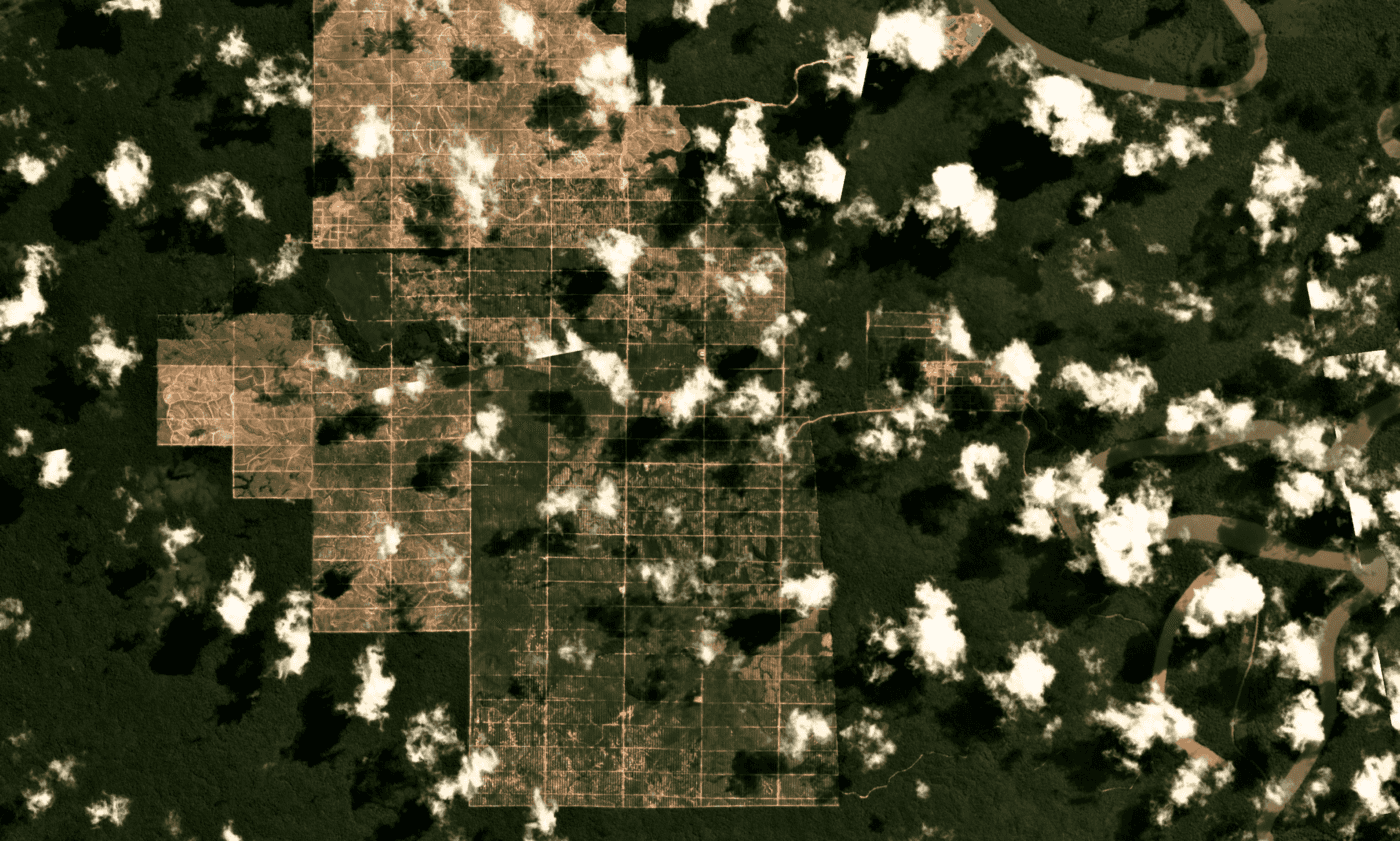
In a separate allegation, the head of the investment office of Boven Digoel district, Papua province, has claimed that a key permit for a sawmill built to harvest timber from the project was also falsified. The allegation was made public last month by Pusaka, an Indonesian nonprofit that advocates for indigenous peoples’ rights.
The case provides a window into how President Joko Widodo’s administration is wrestling with the consequences of two decades of poorly regulated plantation expansion.
Indonesia is the world’s top producer of palm oil, an edible oil found in everything from cosmetics to biofuels. But recent government audits have shown that licensing in the sector has been plagued with irregularities, covering the country in a patchwork of unlawful plantations.
The industry’s unchecked growth has driven the clearance of rainforests and carbon-rich peatlands on a massive scale, contributing to Indonesia becoming one of the world’s biggest greenhouse gas emitters and fuelling annual wildfires that blanket the country and its neighbours in a toxic haze.
In the wake of the 2015 fire and haze crisis, President Widodo announced a freeze on new permits for oil palm plantations, a policy that took effect in September 2018. He also instructed his cabinet to carry out a review of all existing oil palm licenses, in an attempt to bring order to the chaotic sector.
But as the review got underway, government officials quietly papered over an allegation of criminality in Papua, at the heart of the largest remaining tract of rainforest in Asia.
“This is a potential criminal offence,” said Franky Samperante, the director of Pusaka. “It could be a priority for the permit review, and for the permits to be cancelled.”
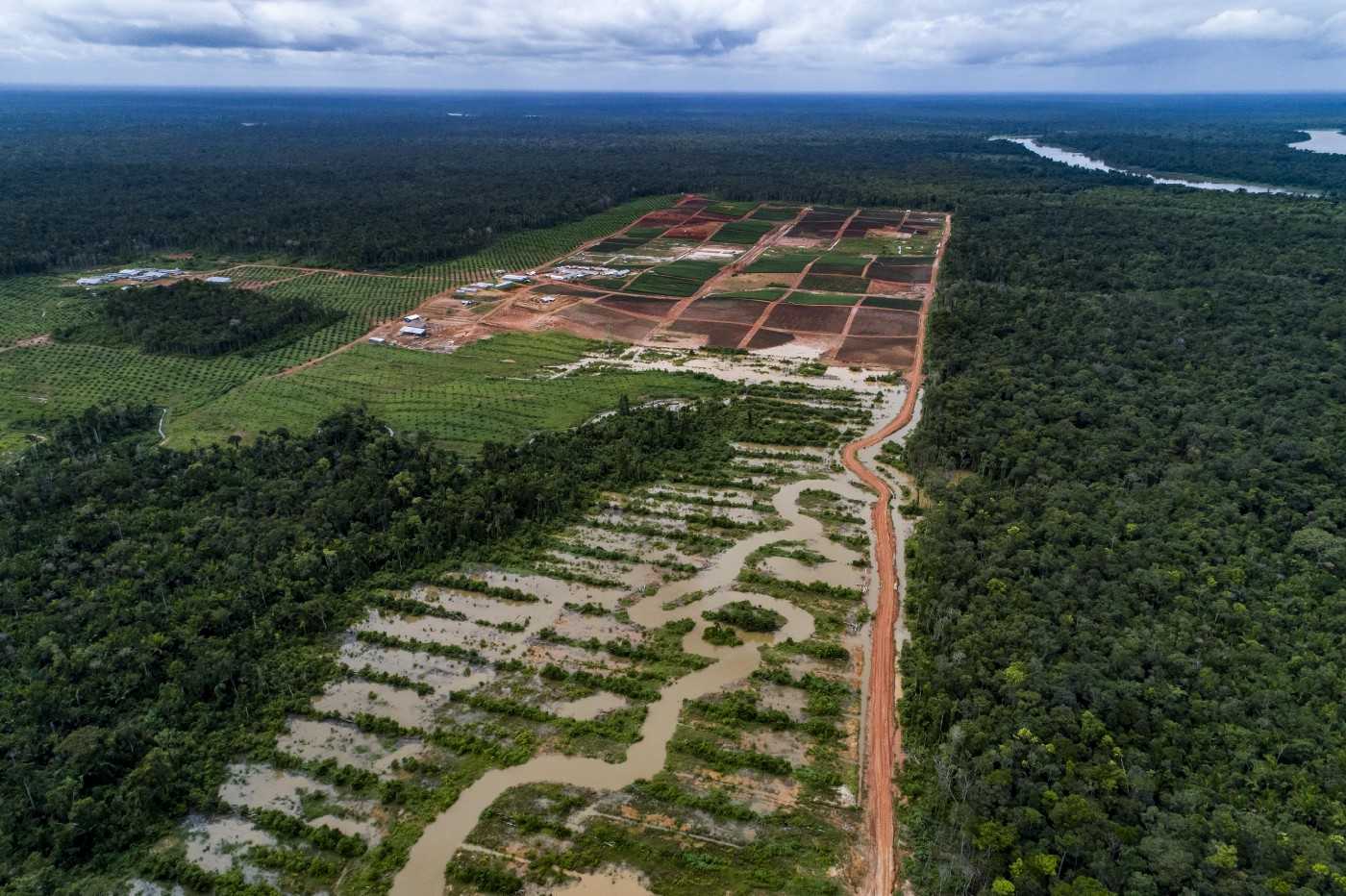
For more than a decade, the Indonesian government has aspired to transform the southern reaches of Papua, from a region of pristine forests sparsely populated by indigenous peoples to a vast expanse of industrial farmland that would provide the nation with food, biofuels and foreign revenue.
That vision has largely foundered, leaving most of Papua’s forests untouched by industrial-scale activities. But over the years, speculators have sought and hoarded plantation permits from district politicians, in the hope that changing economic conditions would spark a development boom.
In 2009, one such investor, a Sumatran named Chairul Anhar, arrived in Papua with ambitious plans to create the world’s largest oil palm plantation.
Chairul, then 43, and his firm, the Menara Group, had no apparent track record managing plantations. But he convinced Yusak Yaluwo, the head of Boven Digoel district, to issue permits to seven shell companies under Menara’s control.
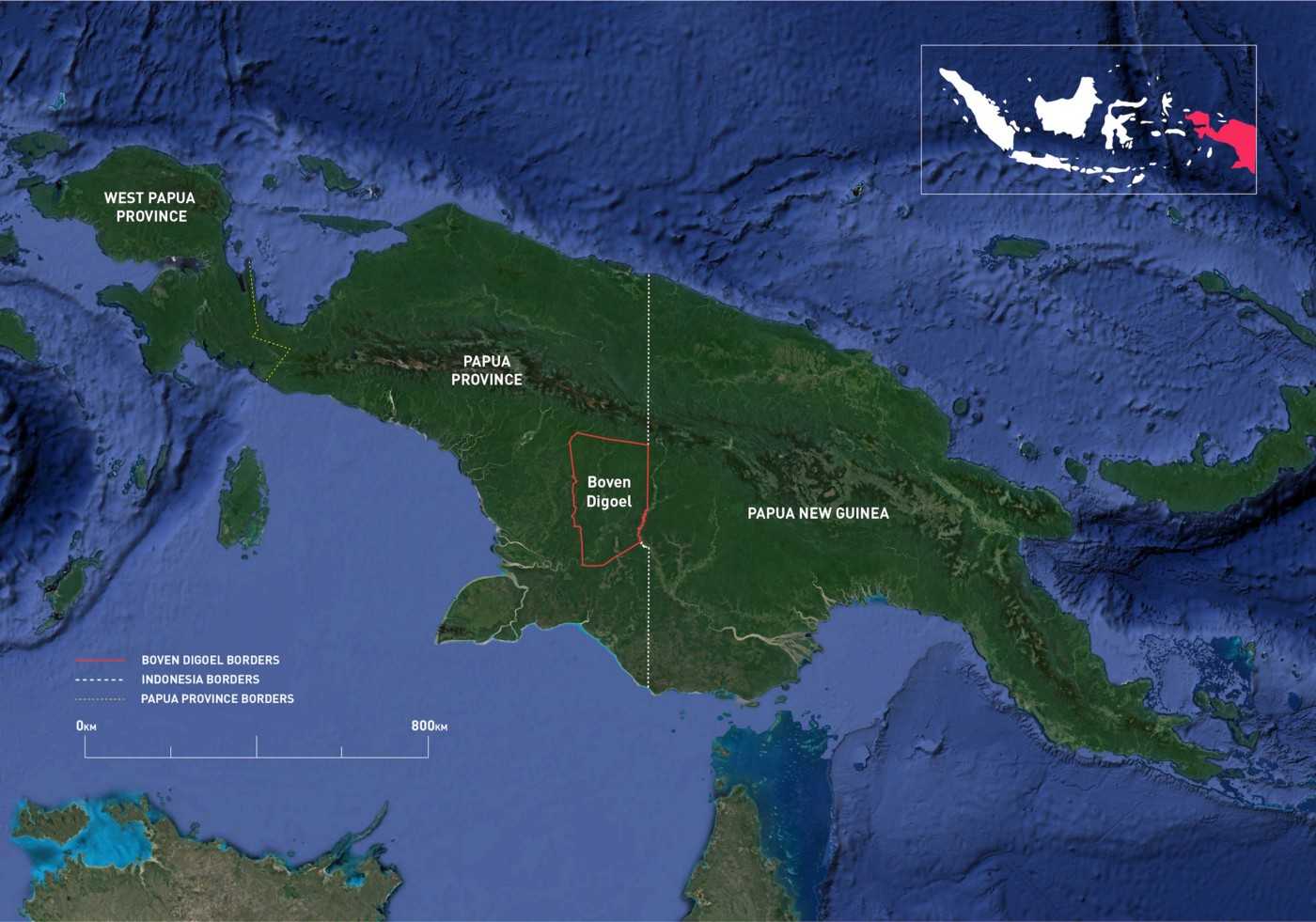
It was the first step in a plan that would entail clear-cutting 2,800 square kilometres of rainforest close to Indonesia’s border with Papua New Guinea, in a remote and isolated area that encompasses the ancestral territory of the Auyu people. It would come to be known as the Tanah Merah project.
An analysis commissioned by investors in the project suggested it could generate almost $6 billion from harvesting precious hardwoods as the forest was cleared, even before the plantation began producing palm oil.
The permits from Yusak were only the first in a succession of approvals the companies needed, from different levels of government, before they could begin operating. Among the most important were plantation business permits, known as IUPs, from the Papua provincial government.
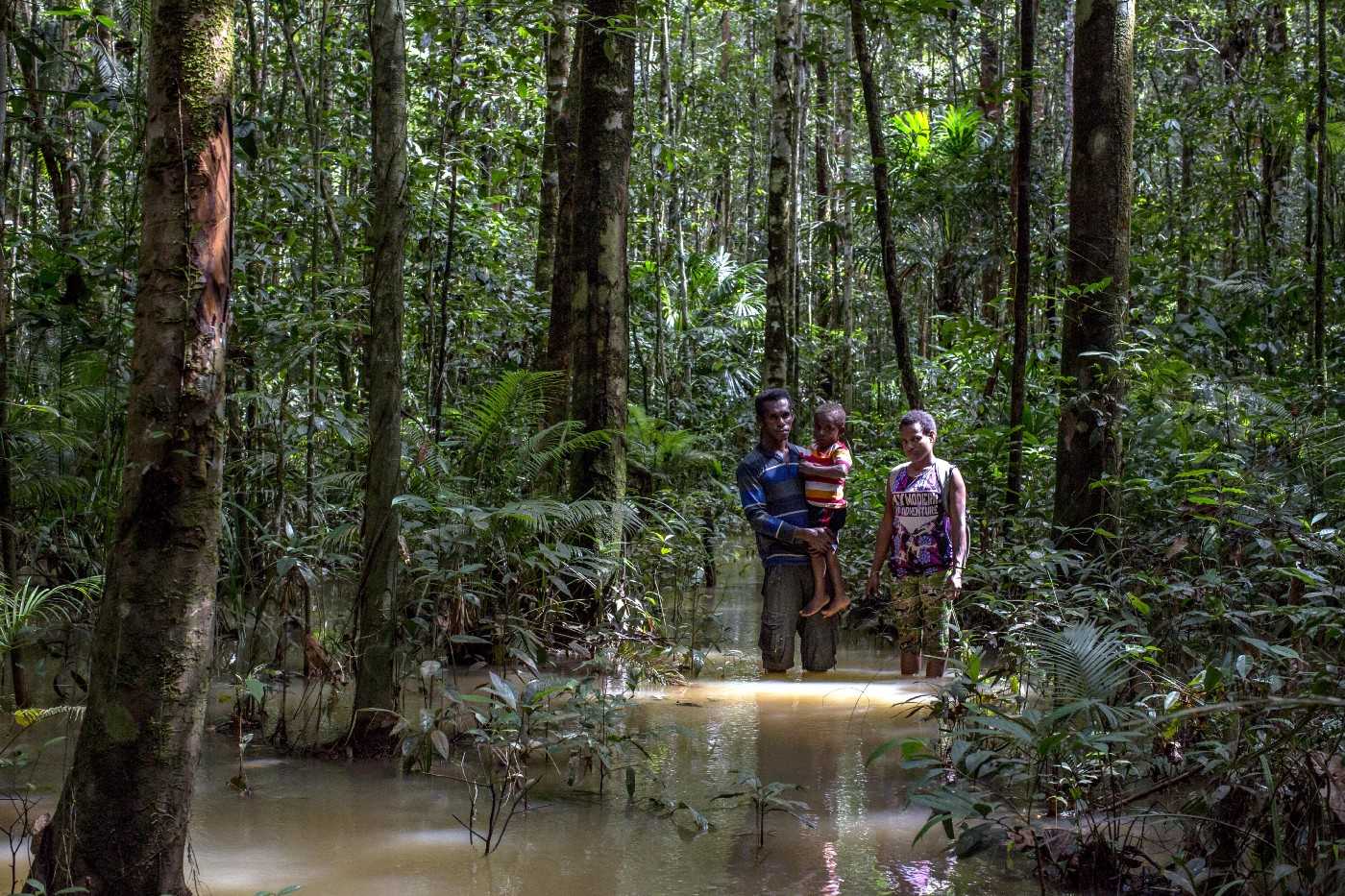
The IUPs were purportedly issued in January and February 2011, according to copies of the documents seen by The Gecko Project and Mongabay.
Instead of developing the land itself, however, Menara proceeded to sell off majority stakes in all but one of the seven companies.
By the end of 2012, two of them had gone to a publicly listed Malaysian logging and property conglomerate, Tadmax Resources, for a total of $80 million. Four more were sold to anonymously owned companies registered in the United Arab Emirates cities of Dubai and Ras Al Khaimah, two of the world’s secrecy jurisdictions, where regulations are deliberately crafted to enable shareholders to hide their identities.
Stock exchange announcements made by Tadmax show that the issuance of the IUPs was fundamental to its decision to invest the $80 million.
The permits were also used to secure a string of decrees from Indonesia’s then minister of forestry, Zulkifli Hasan, that rezoned the land for plantation development.
It is these IUPs — the basis of a multimillion-dollar deal and seven ministerial decrees — that the Papua province investment agency believes were falsified.
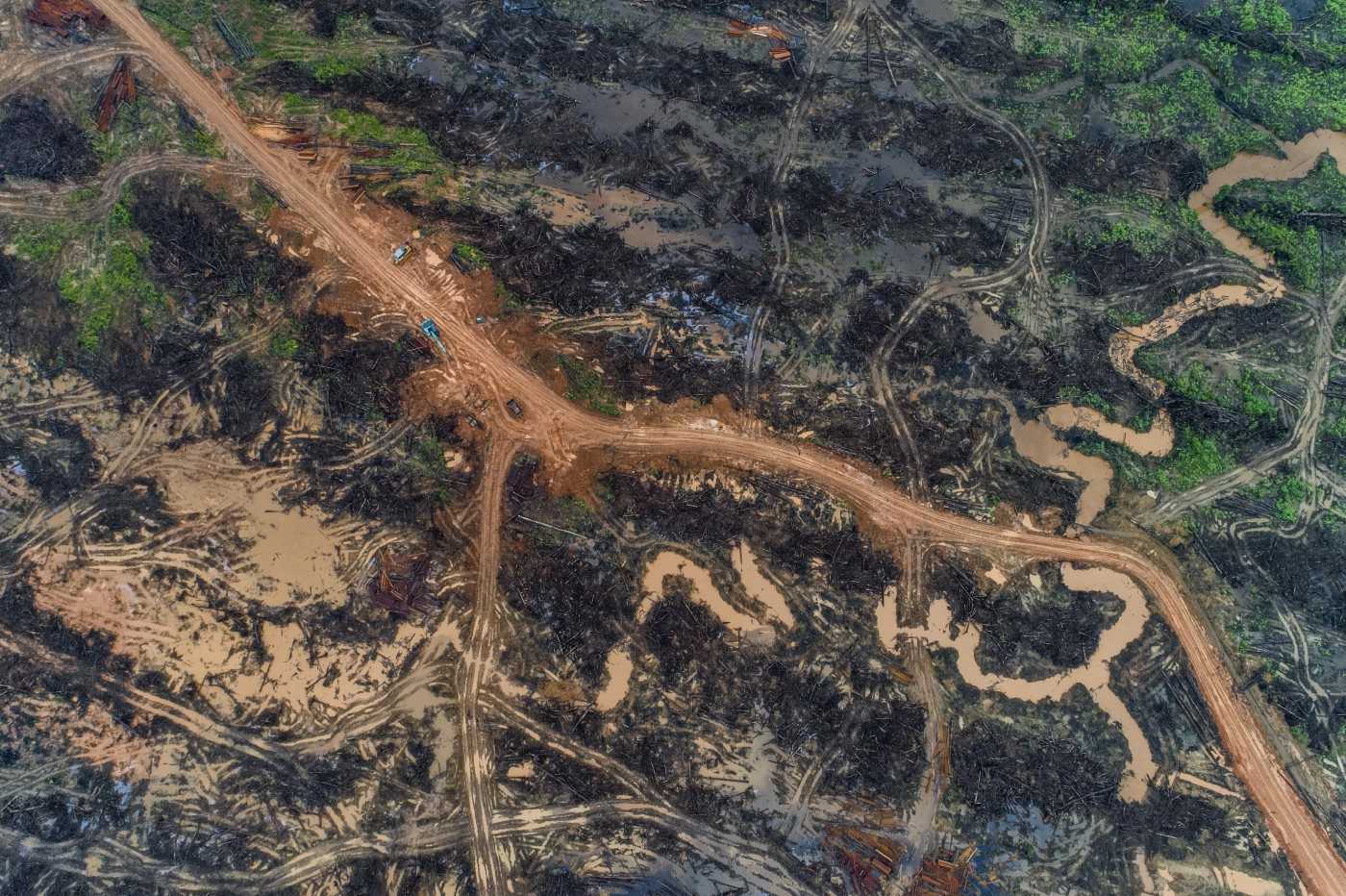
The circumstances that led to both the forgery allegation and the agreement to paper over it have been pieced together by The Gecko Project and Mongabay through interviews with numerous government officials in Papua and Jakarta.
Jamal Tawurutubun, the head of licensing at the Papua investment agency, raised the allegation at a meeting in Jakarta in May this year, in front of senior staff from several government bodies, including two ministries. Also present were executives representing four of the seven companies, that are majority owned by the anonymous investors.
According to Jamal’s account of events, the alleged forgery was first discovered no later than 2013, after his agency learned of the existence of the project by word of mouth.
Jamal was responsible for processing permits, but he had no record of the project in the agency database. When photocopies of the permits began to circulate within the provincial government, it emerged they bore the signature of Purnama, then the head of the Papua investment agency. (Purnama did not respond to requests for comment for this article).
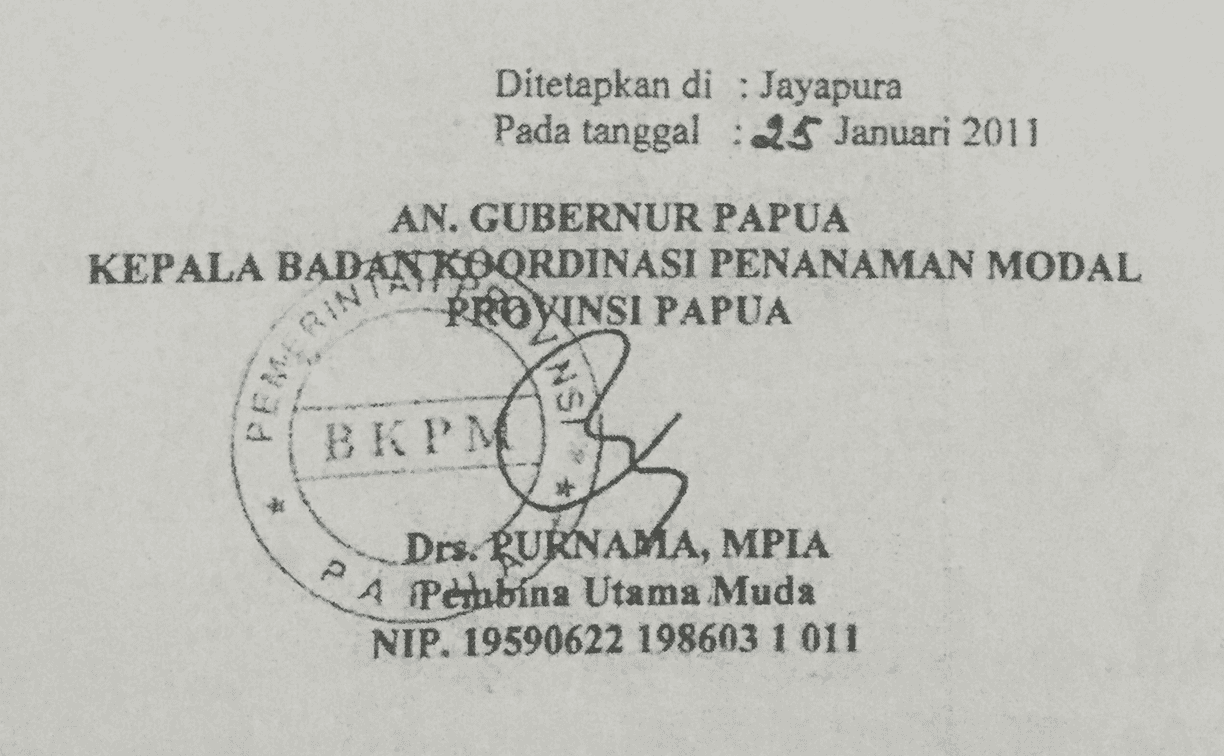
This challenge culminated in the May meeting in Jakarta, where Jamal Tawurutubun raised the forgery allegation. He cited a clause in the 2014 Plantation Law that stipulates a prison term of up to four years for anyone clearing land for a plantation without a valid permit.
The officials present at the meeting agreed that six of the seven companies should not be allowed to operate. But they were hesitant to cancel Megakarya’s permits due to the investment it had already made in clear-cutting the forest and planting oil palm.
As the meeting wound down, the other officials encouraged Jamal to provide more evidence underpinning the allegation. In the meantime, the decision on what to do with Megakarya would be left to the district and provincial governments.
Three months later, Jamal and Jhoni Way, Purnama’s successor as the head of the Papua investment agency, said in an interview that the provincial and district governments had come to an agreement with Megakarya, and with a second company, PT Kartika Cipta Pratama, after discovering that it had also started clearing and planting land. These companies, they told us, could keep operating, provided they redid the entire permit process from the beginning, starting at the district level.
The meeting in Jakarta, Jamal said, was part of a process to “find a solution, the best solution to make the investment work, because they have already spent money.”
“We don’t want it arising again, the idea that Papua is not conducive to investment,” he added.
Jhoni Way speculated that the falsification might have been abetted by someone inside the investment agency. But he insisted the matter had been resolved by the agreement with the companies. “The most important thing is they fix their permits,” he said.
We don’t want it arising again, the idea that Papua is not conducive to investment.
In response to requests for comment on our findings, Megakarya and Kartika each wrote in a letter that their IUPs were “genuine and not falsified”. Both companies said they had “never been informed” of the allegation and that their activities were based on valid permits. They also claimed to have submitted regular progress reports to the relevant authorities, without any issues having been raised.
Other government bodies that are aware of the allegation have done little, if anything, to follow up on it.
Suratmin, a Ministry of Agrarian Affairs and Spatial Planning official who attended the May meeting, told us the ministry had no role in the matter.
Widodo Ekatjahjana, the director general of legislation at the law ministry, declined to comment on the case, adding that any allegations of criminality should be reported to law enforcement.
Agus Ahmad Kurniawan, a forestry ministry lawyer who advises officials on licensing, who was also present at the meeting, said nothing could be done unless the Papua investment agency officials provided more evidence to support the allegation.
“It’s the [provincial] government who can prove whether or not [the permits] were faked,” he said. “But as it stands, they haven’t followed up.”
Djukmarian, the head of the Boven Digoel district investment office, said he was content for the project to go ahead on the grounds that it was in line with the local zoning plan and that local communities were supportive of it. “Look, the people who say [the permits were] faked are from the province,” he wrote in a text message. “So why doesn’t the province bring it into the realm of law?”
Jamal and Jhoni Way, however, took the view that the agreement with the companies had put the matter to rest.
“It’s done,” Jamal said.

The claim that the IUPs were falsified is not the only allegation of impropriety that has been levelled against the Tanah Merah project.
A cross-border investigation published in November 2018 by The Gecko Project, Mongabay, Malaysiakini and Tempo revealed a litany of problems in the way the rights to the concessions had been obtained and traded.
Yusak Yaluwo, the district chief, had granted Menara the rights to more land than a single firm is allowed to control in Papua, blowing through the legal limit of 2,000 square kilometres.
In April 2010, soon after Menara began began the licensing process, Yusak was arrested on unrelated corruption charges. But our investigation found that he continued to sign documents shepherding the project through after he was convicted, while languishing in a prison cell.
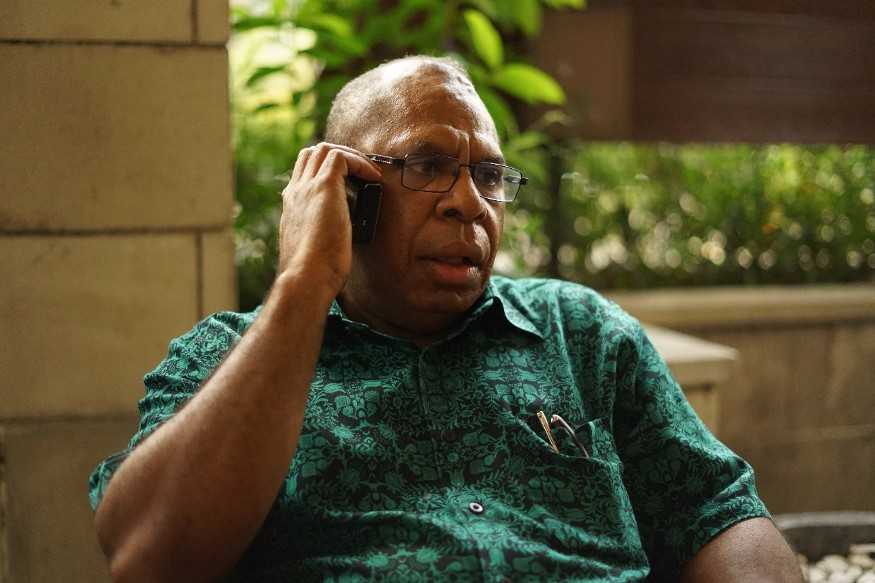
The Menara Group used the names of front shareholders on company documents, including those of Chairul’s driver and a low-paid debt collector.
Menara then sold two of the companies, to Tadmax, via a pair of Singapore-based shell companies that also had front shareholders, obscuring the recipients of the $80 million that flowed offshore as rights to the project changed hands.
Villagers complained that basic information about the project, including its boundaries and scale, were withheld from them. Menara’s representatives were accompanied by police officers and soldiers during their interactions with local communities. On one occasion an Auyu man was reportedly beaten up by a police officer in a meeting about the project at a local schoolhouse.
NGOs have been unable to obtain copies of the environmental impact assessments the companies were required to carry out as part of the permit process. “It’s like there’s a mafia hiding them,” Ronny Tethool, who until recently ran the WWF office in southern Papua, told us in 2017 after trying and failing to obtain the assessments.
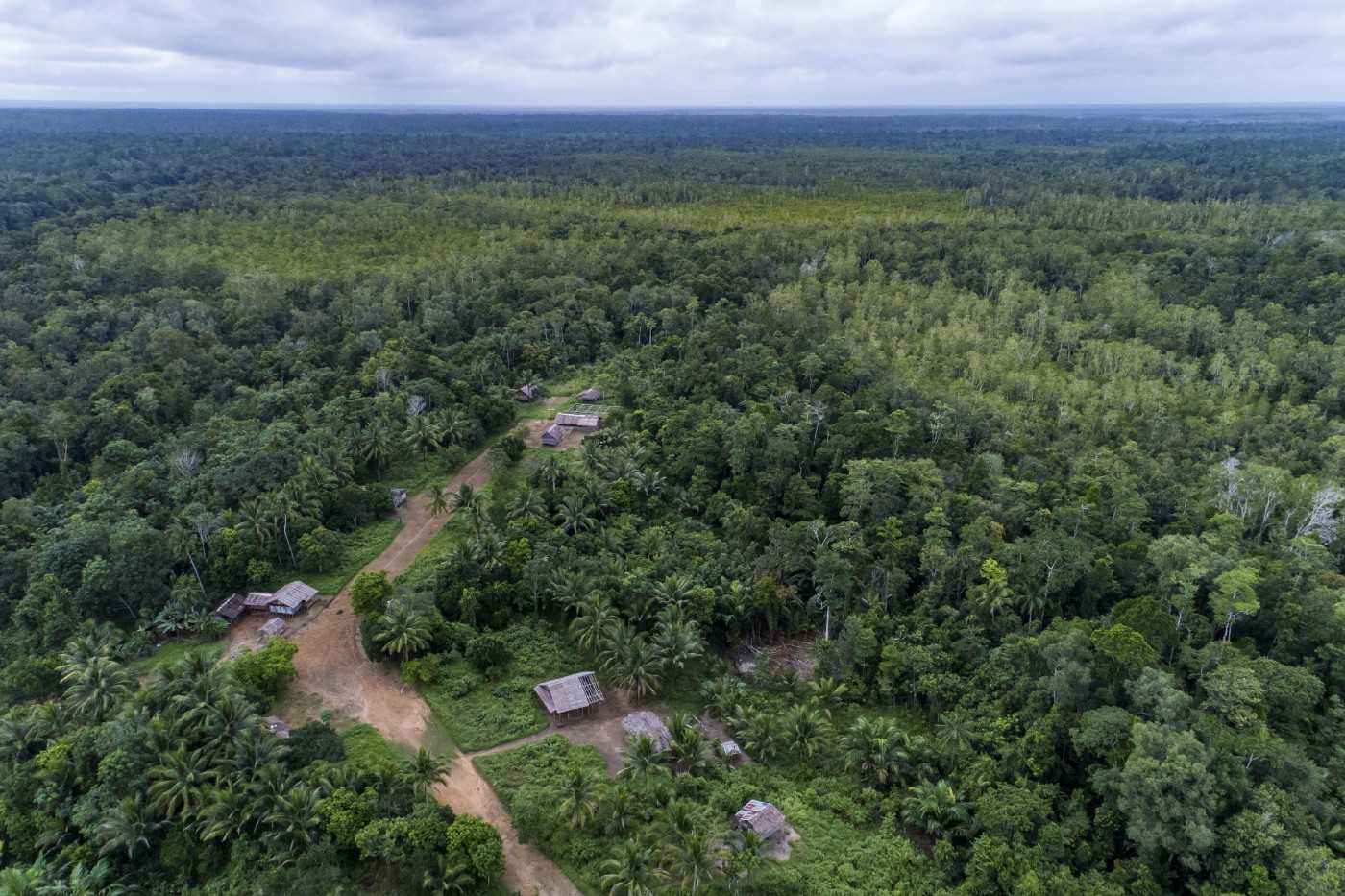
Jamal cited some of these findings as he detailed the forgery allegation during the May meeting in Jakarta.
But even as Menara and its partners pushed to retain their rights to the land, a new allegation was emerging.
Soon after buying into the project, one of the anonymously owned UAE firms formed a joint venture with Shin Yang, the Malaysian logging and plantation giant, to build a sawmill to process timber as the forest was clear-cut. Among the key approvals the joint-venture claimed to have obtained was an environmental license, purportedly signed in 2014 by Wempy Hutubessy, then the head of the Boven Digoel development planning agency.
But in March this year, as construction on the sawmill neared completion, Wempy reportedly issued a statement claiming the environmental license had been falsified. That allegation prompted Djukmarian, the head of the district investment agency, to write to the sawmill firm on November 5, ordering it to stop all activities in the field. Djukmarian’s letter was made public by Pusaka on November 20. The NGO has also called for an investigation into that alleged forgery. (Wempy did not respond to requests for comment for this article).
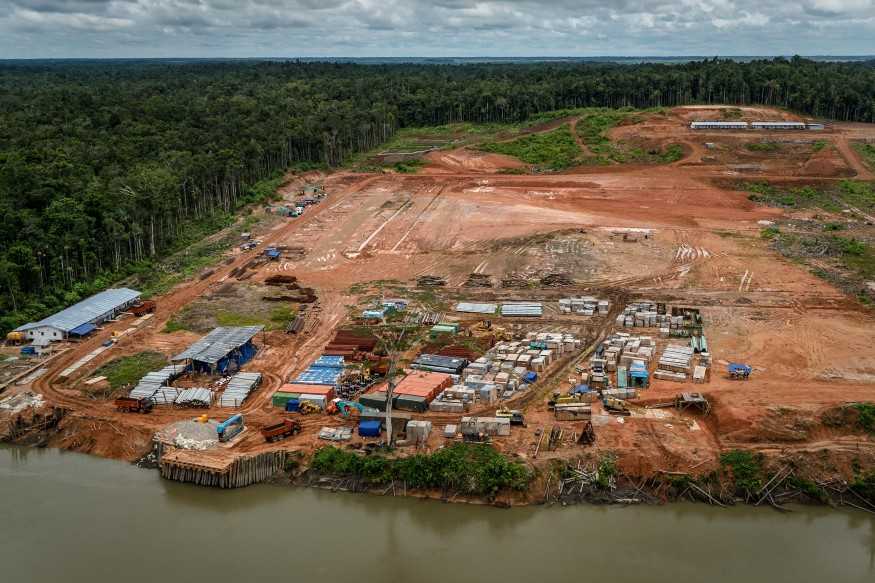
There are no indications as to who may have carried out the alleged falsifications, for either the plantation or the sawmill. The Menara Group, Tadmax and Shin Yang, all of which have invested in parts of the project at various stages, did not respond to questions or requests for comment for this article.
Despite the growing questions surrounding the Tanah Merah project, district and provincial officials maintain that in allowing the plantation companies to keep operating they are acting in the interests of the Auyu people.
Djukmarian, Jamal and Jhoni Way all cited this as a key rationale for letting the plantation companies redo the permit process despite the forgery allegation.
“The community already consented to the companies operating,” Jamal said. “We’re prioritising the interests of the government, and the people.”
Franky Samperante, the Pusaka director, however, has found that many Auyu people remain steadfastly opposed to the project. On a recent trip to Anggai village he found residents divided over whether the project should proceed. To signal their opposition, they had erected symbolic wooden crosses at the borders of the project.
“If this sort of thing continues, it will be dangerous for the country.”
Ultimately, Franky said, local communities had been deprived of the ability to make an informed choice of whether they wanted the project because the state had failed in its duty to protect their rights. He called on the government to investigate the circumstances that gave rise to the project rather than rushing into reissuing the permits.
“This legal problem must be solved first,” he said. “If this sort of thing continues, it will be dangerous for the country.”
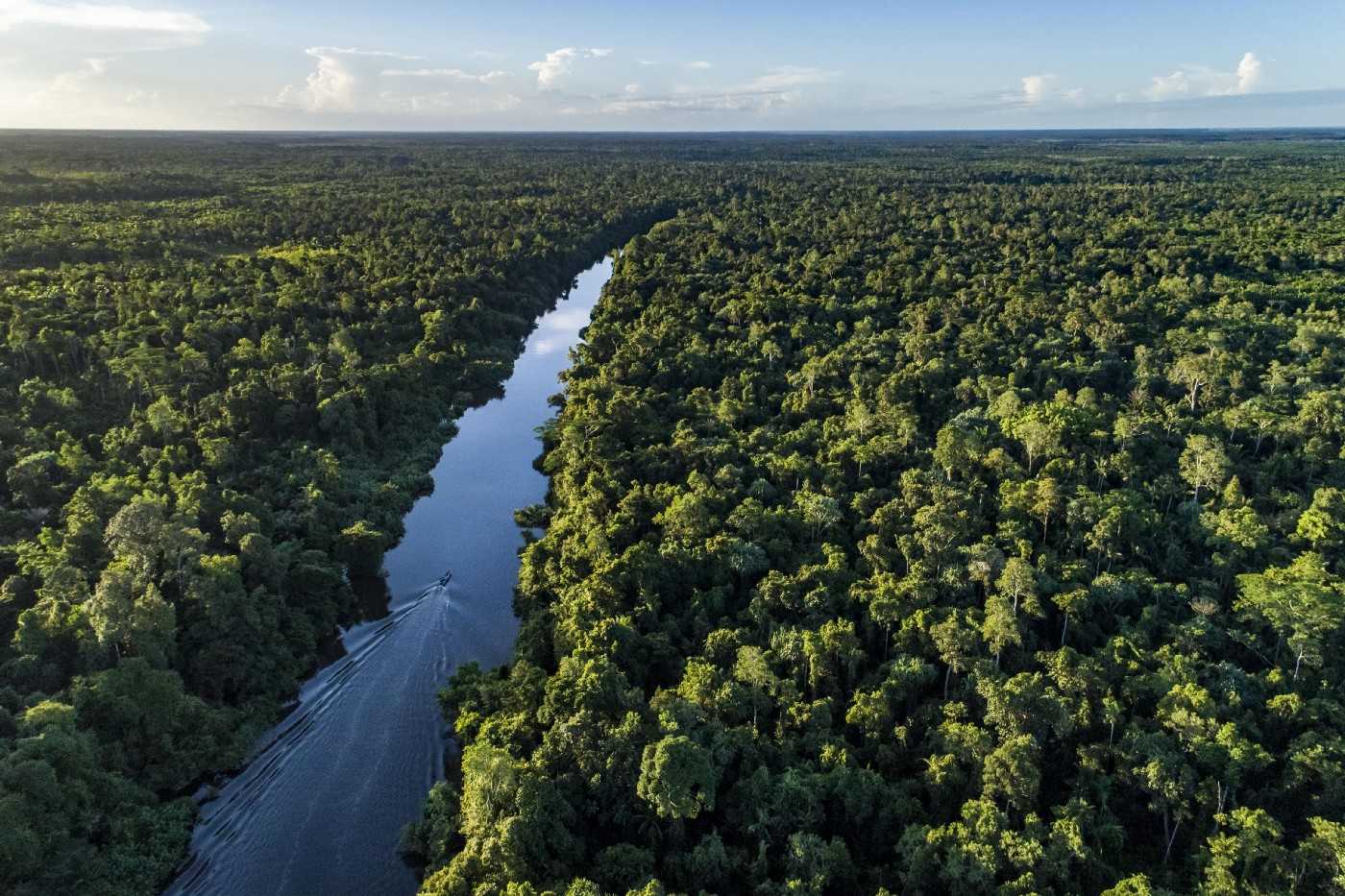
President Widodo and his forestry minister, Siti Nurbaya Bakar, have been at pains to signal that they are ready to curtail deforestation and bring order to the plantation sector.
The stakes are highest in Papua and neighbouring West Papua province, which together hold more than a third of Indonesia’s intact forest. Last year, the governors of the two provinces pledged to protect 70 percent of the land under their jurisdictions, a measure they promised would be supported by “uphold[ing] law enforcement in natural resources.”
The success or failure of that commitment alone could determine whether Indonesia meets its targets for curbing greenhouse gas emissions under the Paris Agreement on climate change, according to the World Resources Institute.
Arie Rompas, the head of forest campaigns at Greenpeace Indonesia, has been monitoring the Widodo administration’s ongoing review of oil palm plantation permits. A comprehensive investigation of the Tanah Merah project, he said, would demonstrate the government’s commitment to stemming deforestation and corruption.
“Papua is the last bastion for saving Indonesia’s forests,” he said. “The parties involved must be brought to justice.”
To see other articles plus films and photos from The Gecko Project as they come out, follow us on Facebook, Twitter, Instagram and YouTube. Sign up to our mailing list here. The Gecko Project stories are available in Bahasa Indonesia at our Indonesian site here.

